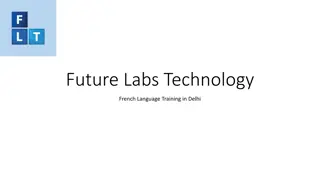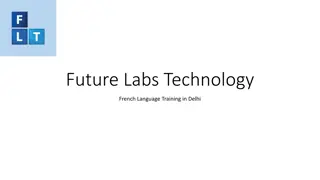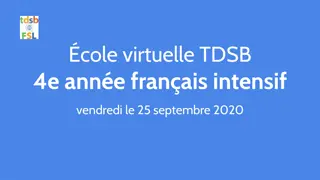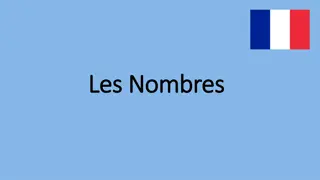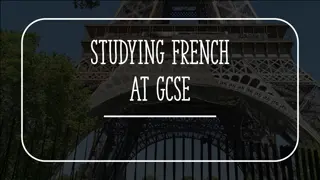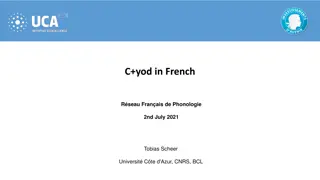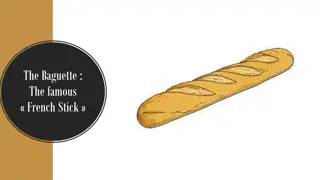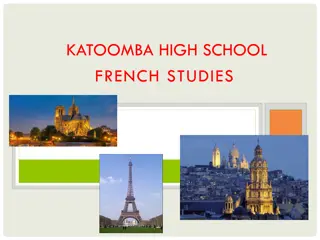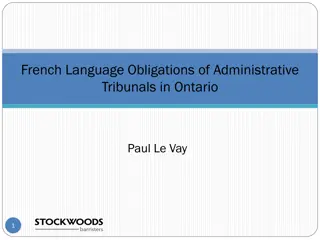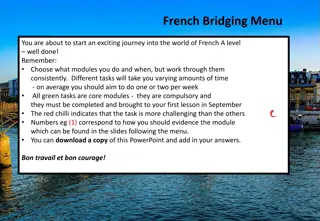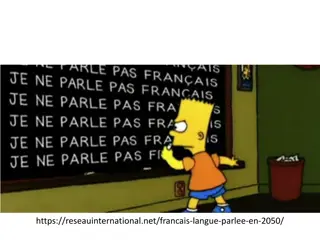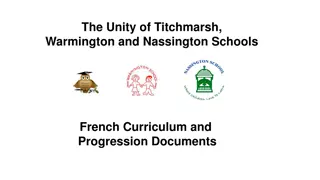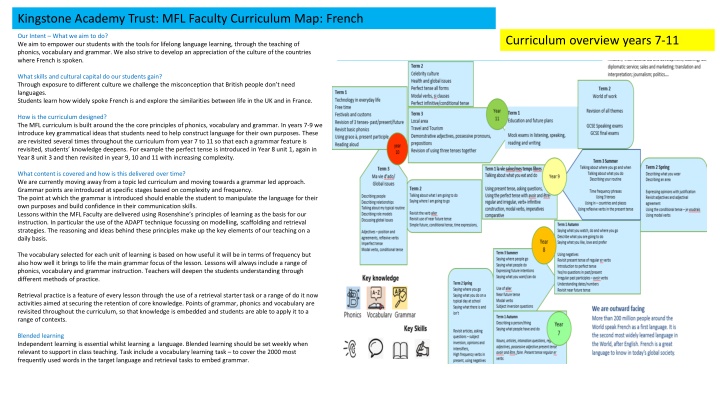
French Curriculum Map at Kingstone Academy Trust MFL Faculty
Explore the French curriculum at Kingstone Academy Trust MFL Faculty, focusing on empowering students with lifelong language learning tools. Delve into phonics, vocabulary, grammar, and cultural appreciation, guiding students from years 7 to 11 towards fluency and cultural immersion in French-speaking countries.
Download Presentation

Please find below an Image/Link to download the presentation.
The content on the website is provided AS IS for your information and personal use only. It may not be sold, licensed, or shared on other websites without obtaining consent from the author. If you encounter any issues during the download, it is possible that the publisher has removed the file from their server.
You are allowed to download the files provided on this website for personal or commercial use, subject to the condition that they are used lawfully. All files are the property of their respective owners.
The content on the website is provided AS IS for your information and personal use only. It may not be sold, licensed, or shared on other websites without obtaining consent from the author.
E N D
Presentation Transcript
Kingstone Academy Trust: MFL Faculty Curriculum Map: French Our Intent What we aim to do? We aim to empower our students with the tools for lifelong language learning, through the teaching of phonics, vocabulary and grammar. We also strive to develop an appreciation of the culture of the countries where French is spoken. Curriculum overview years 7-11 What skills and cultural capital do our students gain? Through exposure to different culture we challenge the misconception that British people don t need languages. Students learn how widely spoke French is and explore the similarities between life in the UK and in France. How is the curriculum designed? The MFL curriculum is built around the the core principles of phonics, vocabulary and grammar. In years 7-9 we introduce key grammatical ideas that students need to help construct language for their own purposes. These are revisited several times throughout the curriculum from year 7 to 11 so that each a grammar feature is revisited, students knowledge deepens. For example the perfect tense is introduced in Year 8 unit 1, again in Year 8 unit 3 and then revisited in year 9, 10 and 11 with increasing complexity. What content is covered and how is this delivered over time? We are currently moving away from a topic led curriculum and moving towards a grammar led approach. Grammar points are introduced at specific stages based on complexity and frequency. The point at which the grammar is introduced should enable the student to manipulate the language for their own purposes and build confidence in their communication skills. Lessons within the MFL Faculty are delivered using Rosenshine s principles of learning as the basis for our instruction. In particular the use of the ADAPT technique focussing on modelling, scaffolding and retrieval strategies. The reasoning and ideas behind these principles make up the key elements of our teaching on a daily basis. The vocabulary selected for each unit of learning is based on how useful it will be in terms of frequency but also how well it brings to life the main grammar focus of the lesson. Lessons will always include a range of phonics, vocabulary and grammar instruction. Teachers will deepen the students understanding through different methods of practice. Retrieval practice is a feature of every lesson through the use of a retrieval starter task or a range of do it now activities aimed at securing the retention of core knowledge. Points of grammar, phonics and vocabulary are revisited throughout the curriculum, so that knowledge is embedded and students are able to apply it to a range of contexts. Blended learning Independent learning is essential whilst learning a language. Blended learning should be set weekly when relevant to support in class teaching. Task include a vocabulary learning task to cover the 2000 most frequently used words in the target language and retrieval tasks to embed grammar.
Future careers in French. Aviation; international aid and development; teaching; law; diplomatic service; sales and marketing; translation and interpretation; journalism; politics . Kingstone Academy Trust: MFL Faculty Curriculum Map: French Term 2 Health and global issues Perfect tense all forms Modal verbs, si clauses Perfect infinitive/conditional tense Term 2 Term 1 Technology in everyday life Free time Festivals and customs/ celebrity culture Revision of 3 tenses- past/present/future Revisit basic phonics Using grace , present participle Reading aloud World of work Year 11 Revision of all themes Term 1 Education and future plans Term 3 Local area Travel and Tourism Demonstrative adjectives, possessive pronouns, prepositions Revision of using three tenses together GCSE Speaking exams GCSE final exams Mock exams in listening, speaking, reading and writing year 10 Term 3 Summer Term 2 Spring Describing what you wear Describing an area Talking about where you go and when Talking about what you do Describing your routine Term 3 Ma vie d ado/ Global issues Term 1 la vie saine/mes temps libres Talking about what you eat and do Year 9 Term 2 Talking about what I am going to do Saying where I am going to go Using present tense, asking questions, Using the perfect tense with avoir and tre- regular and irregular, verb+ infinitive construction, modal verbs, imperatives comparative Time frequency phrases Using 3 tenses Using in countries and places Using reflexive verbs in the present tense Expressing opinions with justification Revisit adjectives and adjectival agreement Using the conditional tense je voudrais Using modal verbs Describing people Describing relationships Talking about my typical routine Describing role models Discussing global issues Revisit the verb aller Revisit use of near future tense Simple future, conditional tense, time expressions, Term 1 Autumn Saying what you watch, do and where you go Describe what you are going to do Saying what you like, love and prefer Adjectives position and agreements, reflexive verbs Imperfect tense Modal verbs, conditional tense Year 8 Term 3 Summer Saying what there is/isn t Describing what you can do Describing where you can go Expressing future intentions Use of il y a/il n y a pas de Use of aller Near future tense Modal verbs Subject inversion questions Using negatives Revisit present tense of regular er verbs Introduction to perfect tense Yes/no questions in past/present Irregular past participles avoir verbs Understanding dates/numbers Revisit near future tense Term 2 Spring Giving your opinion Saying what you do on a typical day at school Say what you eat and drink Term 1 Autumn Describing a person/thing Saying what people have and do Year 7 Revisit articles, asking questions subject inversion, opinions and intensifiers, High frequency verbs in present, using negatives Nouns, articles, intonation questions, regular adjectives, possessive adjective present tense avoir and tre, faire. Present tense regular er verbs.
Year 7 Autumn Term 1 Key knowledge Grammar Ssc sound symbol correspondence Blended learning SMSC links Big Picture Avoir and tre 1st/2nd/3rd person sing Describing a person/thing Saying what people have and do Ai/oi Ch/ /soft c Qu/j/soft g Tion/ien SFC Revisit a/i Mixed word vocab lists to learn 10 words per week British values Respect Understanding what makes you who you are as a person. Using c est Numbers 1-31 Definite articles le/la/l /les Using faire Adjectival agreement Plural nouns x/s High frequency vocab relevant to context Cultural differences greetings Key Questions Qu est-ce que c est? Tu est comment? Tu es de quelle nationalit ? As-tu des fr res et des soeurs? As-tu un animal? Qu est-ce que tu fais? Learning basic structures that will be used until GCSE to introduce and describe yourself and others Yes and no questions raised intonation Vocabulary focus Recognition How to learn vocabulary Pronunciation Spelling Using word in a sentence Reading focus Sept couleurs magiques poem Writing focus wanted/missing poster Speaking KQ conversation
Year 7 Autumn Term 2 Key knowledge Grammar Ssc sound symbol correspondence Blended learning SMSC links Big Picture Saying what people do people do and play Saying what people play and do Asking and answering basic questions Inversion questions aimes - tu? Intonation to ask questions Using opinion verbs Simple connectives Using jouer / faire de SFC silent final consonant a i eu e/ au/eau/o u/ou SF E/ /et/er en/an/on ain/in/ / Liason t/s Mixed word vocab lists to learn 10 words per week Cultural differences Learning how to express likes and dislikes Christmas in France - High frequency vocab relevant to context Key structures that will be used each year until GCSE Key Questions Tu es sportif(ve)? Tu aimes le sport? Que fais tu quand il fait beau? Qu est-ce que tu aimes ? Vocabulary focus Recognition How to learn vocabulary Pronunciation Spelling Using word in a sentence Deepening vocabulary through a challenging text Learning how to take part in simple conversations Using faire Using regular er verbs to say what you do 1st/2nd/3rd person. Develop a lexicon of regular er verbs Using 2 verb structures aimer + inf Reading focus Writing focus- describing a picture Speaking questions, questions, questions paired speaking
Year 7 Spring Term 1 Key knowledge Grammar Ssc sound symbol correspondence Blended learning SMSC links Big picture Saying what people do people do and play Saying what people do Describing your routine On a school day A students school day forms a major part of their life between the ages 5-16. Asking and answering basic questions Inversion questions aimes - tu? Intonation to ask questions Using opinion verbs Simple connectives and intensifiers Telling the time Using basic negatives In Oi SFE Mixed word vocab lists to learn 10 words per week Differences in school life Create a French page for our website- High frequency vocab relevant to context Students learn the key structures and grammar to be able to discuss their day and use prior learning to give opinions about what they do/learn. Key Questions Tu aimes tes mati res? Quelle heure est-il? Ta journ e est comment? Reading focus Using regular er verbs to say what you do 1st/2nd/3rd person. Develop a lexicon of regular er verbs Writing focus- describing your day storyboard Speaking reading aloud Key questions conversation Use a year 7 version of avocado sheet to support writing
Big Picture Year 7 Spring Term 2 Key knowledge Grammar Ssc sound symbol correspondence Blended learning SMSC links Saying what people do people do and play Saying what you eat and drink and why Discussing mealtimes Using extended opinions introduced earlier in year 7 Asking and answering basic questions Eu/eau Oi Ui SFC In ou Mixed word vocab lists to learn 10 words per week Cultural study: Easter Social conventions Extended opinions with reasons High frequency vocab relevant to context Start to build up a bank of questions and answers that can be used in GCSE level conversations British values - respect Making invitations Ordering drinks and snacks Using larger numbers Connectives and intensifiers Revisit near future tense Revisit essential verbs Deepening vocabulary knowledge Key Questions Qu est-ce que tu aimes manger et boire? Qu est-ce que tu n aimes pas? Pourquoi? Quel est ton plat pr fer ? Tu veux aller au caf ? Qu est-ce que tu vas faire? Vous d sirez? Learn about social conventions when eating out/ ordering food in France Use of verb vouloir 1st/2nd/3rd person Reading focus Le d jeuner du matin poem Writing focus making an invitation Describing a picture Speaking Au caf role/play Key questions conversation
Big Picture Year 7 Summer term 1 Key knowledge Grammar Ssc sound symbol correspondence Blended learning SMSC links Saying what people do people do and play Saying what there is and isn t Saying what you can and cannot do Being able to discuss your area Where it is in the country, and your opinion of what it is like Asking and answering basic questions Inversion questions Il y a un/une Oi i Silent final e SFC Mixed word vocab lists to learn 10 words per week Looking at towns in France Comparison between Hereford and twin town in France High frequency vocab relevant to context Looking at areas of France to develop geographical knowledge of the TL country. Intonation to ask questions Key Questions Qu est-ce qu il ya dans ta ville? Comment est ta ville? Qu est-ce qu on peut faire? O vas tu le weekend? British values respecting other people and their opinions Using opinion verbs Simple connectives and intensifiers A basic knowledge of what different regions of France are like Using basic negatives Using modal verb + infinitive Reading focus Writing focus- O j habite written presentation Speaking describing a photo Key questions conversation
Year 7 Summer Term 2 Key knowledge Grammar Ssc sound symbol correspondence Blended learning SMSC links Big picture Saying what people do people do and play Saying where you go places , countries Saying what you are going to do Understanding where places are in the world Asking and answering basic questions Question words Comment O Quand? Ou SFE /er/et En/an/on Mixed word vocab lists to learn 10 words per week Regions of France Understanding the concept of Francophone countries what they are and where they are. High frequency vocab relevant to context Tour de France cultural work Key Questions O vas tu? Comment voyages tu? Quand vas-tu? Qu est-ce que tu vas faire? Saying to/in en/ Using the near future tense Aller 1st/2nd/3rd person Reading focus holiday regions of France Francophone countries Writing focus - Mes vacances extended writing task Speaking reading aloud Key questions conversation
Big picture Year 8 Autumn Term 1 Key knowledge Grammar Ssc sound symbol correspondence Blended learning SMSC links Saying what people d Expressing how you feel Saying what you do and where you go? Saying what you don t do and why Talking about what you have done. Looking at popular culture Present tense of regular verbs: regarder aimer d tester pr f rer Revisit eu Closed o Open 0 S Soft Gn j/soft g Th Que Revisit year 7 vocabulary for first two weeks Internet safety Understanding how music and film preferences vary in France to those in our country Deepening vocabulary knowledge Cultural links French cinema/ literature Present tense aller/faire Aller + infinitive Negatives - extend Present and perfect Introduction to French cinema and literature Key questions Qu est-ce que tu regardes? Tu aimes aller au cinema? Que fais tu quand tu es connect ? Yes/No questions in two tenses Irregular past participles Film Study monstre Paris Use a year 8 version of avocado sheet to support writing Reading: One short story study lesson from either spy/gothic genre Speaking key questions Writing Hier soir extended writing using two tenses
Year 8 Autumn Term 2 Key knowledge Grammar Ssc sound symbol correspondence Blended learning SMSC links Big picture Saying what people do people do and play Saying what you celebrate Saying how you celebrate Describing when you celebrate Understanding different celebrations and festival from the TL country Understanding dates, numbers and months Nasals In/ SFC er endings Mixed word vocab lists to learn 10 - 15 words per week Christmas in France British Values respect for different cultures and religions Using opinions to express likes and dislikes High frequency vocab relevant to context Staring to learn the basic structures and vocabulary needed to talk about festivals in different time frames in line with GCSE unit 5 theme 2 Popular culture Key questions Tu aimes les f tes? Tu vas au carnaval? Quelle est ta f te pr f r ? Tu vas au march de No l Describing an event Deepening vocabulary knowledge Present tense of er, ir and re verbs Using the near future tense Aller + infinitive Listening transcription and dictation task once a week Reading short story study from year 8 reading pack Speaking ma f te pr f r e presentation Reading aloud passage Writing je vais au march de No l Describing a picture
Year 8 Spring Term 1 Key knowledge Grammar Ssc sound symbol correspondence Blended learning SMSC links Big picture Saying what people do people do and play Describing colours and styles of clothing Revisit adjectives Adjectival agreement Oi Eu Au SFE Silent final consonant Mixed word vocab lists to learn 10-15 words per week Understanding that we all have our own style what is that and why based on our preferences. Differences between French and English schools uniform Complete opinions for French link school on wearing uniform Extended opinions Saying what you would like to do and wear Describing your routine High frequency vocab relevant to context Using three tenses Basic perfect/near future Conditional using je voudrais Clothes are an underlying theme in many topics, a basic understanding of simple clothes vocabulary is needed by all students when discussing free time/ festivals/celebrity culture/holidays Deepening vocabulary knowledge Key Questions Qu est-ce que tu portes? Qu est-ce que tu aimes porter et pourquoi? Comment est ta journ e Comment est ton uniforme? Qu est-ce que tu voudrais porter? British values respect Using modal verbs to say what you have to do Using reflexibve verbs in the present tense to describe your routine Use a year 8 version of avocado sheet to support writing Reading Continue with reading focus Tintin or short stories pack for year 8
Year 8 Spring Term 2 Key knowledge Grammar Ssc sound symbol correspondence Blended learning SMSC links Big picture Saying what people do people do and play Describing your area and home Describing your dreams and future plans This unit will focus on describing the area where we live this will help students to think about the world around them preparation for GCSE unit 9 the local environment and my town Asking and answering basic questions Gn Mixed word vocab lists to learn 10- 15 words per week Work for school website to use for link school on what are area is like and where our students live Extended opinions with reasons Connectives and intensifiers Revisit adjectives Revisit conditional tense using je voudrais Revisit essential verbs High frequency vocab relevant to context Key questions O habites- tu? Comment est ta region? Tu aimes y habiter? O voudrais tu habiter? Deepening vocabulary knowledge Listening transcription one task per week Dictation one task per week Speaking describing a photo and key questions Reading study of short story pack depending on class Writing describe a picture and answer key questions
Big picture Year 8 Summer Term 1 Key knowledge Grammar Ssc sound symbol correspondence Blended learning SMSC links This unit encourages students to think about the wider world where they like to go and where they would like to go in the future. Saying what people do people do and play Talking about where you go Talking about what you do Talking about what you did and are going to do Talking about when- using time expressions Frequency phrases Using en/au in/to Using 3 tenses past/present/future En Au Ill Ai Mixed word vocab lists to learn 10 - 15 words per week British values respect Cultural knowledge Petit Nicolas film study High frequency vocab relevant to context The key knowledge links with Unit 7 Theme 3 GCSE Travel and Tourism and places of interest. Key Questions O vas-tu? Que fais tu en vacances? Comment vas-tu et avec qui? C tait comment? Qu est-ce que tu vas faire en t ? Deepening vocabulary knowledge The work should also support regional knowledge of France Listening recognising time triggers Speaking reading aloud Use a year 8 version of avocado sheet to support writing Reading information on holiday areas in France Writing open ended task mes vacances Les vacances de Petit Nicolas film study
Year 8 Summer Term 2 Key knowledge Grammar Ssc sound symbol correspondence Blended learning SMSC links Big picture Saying what people do Describing my routine Describing when I do things This unit covers key structures and vocabulary needed in GCSE theme 1 Identity and culture. Enabling students to discuss their personal world Using reflexive verbs in the present tense Revisit telling the time Ou Ch SFS Oi SFE Mixed word vocab lists to learn 10 - 15 words per week Bastille Day Social conventions Describing how my routine changes at the weekend Using sequencers and time expressions to add structure High frequency vocab relevant to context British values - respect Discuss what you eat/drink/wear/do/play etc Key questions: D cris ta routine Comment est ta journ e? Et ta routine au weekend? Deepening vocabulary knowledge Revisit verbs in the present tense regular and irregular high frequency verbs jouer/regarder/porter/man ger/boire/faire/aller Using reflexive verbs in the past perfect tense Listening listening for gist Use a year 8 version of avocado sheet to support writing Speaking peer key question question and answers Reading a short story study from the pack Writing storyboard/mini book ma routine task
Year 9 Autumn Term 1 Key knowledge Grammar Ssc sound symbol correspondence Blended learning SMSC links Big picture Saying what people d Ma vie saine Eu/eau Oi Ui SFC In ou Mixed word vocab lists to learn 20-30 words per week British values - respect Extended opinions with reasons Revisit key verbs in the present tense Boire Manger Faire Aller Time and frequency phrases Using modal verbs il faut/devoir/pouvoir Using comparatives plus/moins que Using food and sport vocabulary learnt in year 7 to discuss lifestyle choices and habits Talking about diet and eating habits Talking about sport and exercise Talking about lifestyle choices Comparative Giving advice Talking about future changes Healthy eating and lifestyle choices High frequency vocab relevant to context Deepening vocabulary knowledge Learning about what constitutes a healthy lifestyle Thinking about how you can improve your lifestyle in the future Key questions Tu manges sainement? Tu es en forme? Que fais tu pour rester en forme? Qu est-ce que tu vas faire? Covering the key structures needed to continue this topic at GCSE level.
Year 9 Autumn Term 2 Key knowledge Grammar Ssc sound symbol correspondence Blended learning SMSC links Big picture Saying what people do pMes passe temps Saying what I do and when I do it. Saying where I go Expressing opinions Asking and answering basic questions Er/ Au Oi Ai Mixed word vocab lists to learn 10 words per week Cultural knowledge les choristes film study Revisit the basic vocabulary and structures introduced in year 7 and 8 to discuss free time. Extended opinions with reasons Time and frequency phrases negatives Connectives and intensifiers Revisit near future tense and perfect tense. Revisit essential verbs in three tenses Aller Faire Jouer Regarder High frequency vocab relevant to context Learn to explain how your interests have changed since you were younger. Saying what I did and what I am going to do Key questions Qu est-ce que tu aimes faire? Quand et avec qui? Qu est-ce que tu as fait le weekend dernier? Qu est-ce que tu vas faire le weekend prochain? Deepening vocabulary knowledge Develop your answers to the key questions in enough detail for GCSE style written and spoken answers on this unit Film Study Reading extended texts or short story, gothic genre. Speaking reading aloud Photocard Conversation questions Use a year 9 version of avocado sheet to support writing Writing 90 word question To cover three tenses
Year 9 Spring Term 1 Key knowledge Grammar Ssc sound symbol correspondence Blended learning SMSC links Big picture Saying what people d Mon avenir Asking and answering basic questions Mixed word vocab lists to learn 15 - 20 words per week Careers work links using languages later in life The world of work careers using languages and possibilities with languages. Oi SFC In Er ending Talking about possible plans and dreams for the future Extended opinions with reasons Connectives and intensifiers Case studies and options choices High frequency vocab relevant to context Discussing option choices and preferences for future study post 16 and further Video from British Council why study languages Covering the vocabulary and structures needed to develop this theme at GCSE level. Revisit near future tense Introduce the simple future Deepening vocabulary knowledge Saying what you want to do/will do/and hope to do Revisit the basic conditional tense je voudrais + infinitive Discussing the world of work what/where/why Revisit basic negatives to express what you don t want to do. Discussing the value of continuing with language Learning Use of verb vouloir 1st/2nd/3rd person Reading focus case studies using languages in my job Use of modal structures Il faut/ on doit Speaking peer assessment Key questions Writing mon avenir 90 word task
Year 9 Spring Term 2 Key knowledge Grammar Ssc sound symbol correspondence Blended learning SMSC links Big picture Saying what people do Mes vacances Asking and answering basic questions Gne An/in Oi Ui SFC ou Mixed word vocab lists to learn 15-20 words per week Easter traditions in France Learning about the world around us. Saying where you go/ what you do/ how you travel and who you travel with usually Extended opinions with reasons High frequency vocab relevant to context Revisit basic holiday vocabulary from year 7 and 8 to develop and broaden students knowledge in preparation for GCSE. Talking about a past holiday Revisit the use of en/au/aux Deepening vocabulary knowledge Discussing a dream holiday in the future Key questions O vas-tu en vacances? Que fais tu en vacances? Qu est ce que tu as fait et avec qui? Tes vacances de r ve? Revisit the use of three tenses with high frequency verbs past/present and future Revisit essential verbs in the perfect tense Simple conditional for all students using je voudrais Listening focus recognising changes in tense Revisit conditional of key verbs for set 1 students Reading short story pack Speaking answering basic GCSE style questions on holiday preferences Writingp standard 90 word GCSE mes vacances
Year 9 Summer Term 1 Key knowledge Set 1 only ing what people Ma vie d adod Grammar Ssc sound symbol correspondence Blended learning SMSC links Big picture Revisit adjectives, adjectival endings, position Eu/eau SFC In Ou oi Mixed word vocab lists to learn 15-20 words per week Bastille Day Thinking about your identity. Who are you what are your relationships with the people that are important to you and why? Describing the people that are important to you Social conventions Extended opinions with reasons What their relationship to you is and how you get on with them. High frequency vocab relevant to context British values - respect Use of reflexive verbs to describe personal relationships and weekend routine Deepening vocabulary knowledge Who do you aspire to be/who do you admire? Talking about role models, characteristics you like and dislike Saying how people and preferences have changed from when they were younger Arranging to go out with friends and family Key questions: Tu es comment? Comment est ta famille? Tu t entends bien avec? Comment est ton/ta copain(e)? Quelle personne admires-tu? Tu tais comment? Tu veux sortir? How have you changed since you were little? Use of conditional to talk about aspirations This unit is the starting point for Theme 1 GCSE People and culture unit 1 Identity and relationships Use of imperfect tense to talk about how you and things used to be Use of verb vouloir/pouvoir 1st/2nd/3rd person to make arrangements Revision of basic time phrases Use a year 9 version of avocado sheet to support writing Paired speaking on key questions Writing assessment je me pr sente Describing a photio
Year 9 Summer Term 2 Key knowledge Set 1 only Grammar Ssc sound symbol correspondence Blended learning SMSC links Big picture Looking a eating habits revisit work from earlier in year 7 to be able to discuss eating habits and preferences in detail. La nourriture et moi do and play Saying what you eat and when Revisit opinions and justification Revisit all phonics covered Vocab drilling each lesson to revise key vocabulary from the year British values respect Use avocados sheet to vary opinion phrases used Looking into changing eating habits in society Explaining why you eat certain foods Use of all tenses covered to include different time frames in written and spoken work Look at views on diet choices and reasons why people choose to be vegetarian/ vegan Discussing eating habits vegetarianism/veganism Key questions: Qu est-ce que tu aimes et n aimes pas manger? Pourquoi? Qu est-ce que tu as mang hier soir? Tu manges de la viande? Revisit all grammar structures as part of revision schedule prior to exams Bring the year 9 curriculum together for the end of year exam Use a year 9 version of avocado sheet to support writing and speaking Describing a picture Writing extended texts from memory Preparation for end of year exam
Big picture Year 9 Summer Term 1 Key knowledge Set 2 only Grammar Ssc sound symbol correspondence Blended learning SMSC links Looking at different regions of the target language country Project based learning Focus on either do and play Exploring Midi Pyrenees Or Auvergne/Rh ne Alpes This fits into Theme 3 of GCSE specification the world around us to provide cross curricular learning for the students who have not chose to continue with French at GCSE These cultural projects can be delivered in conjunction with a film study depending on curriculum time




